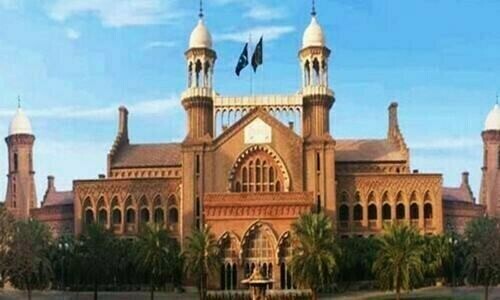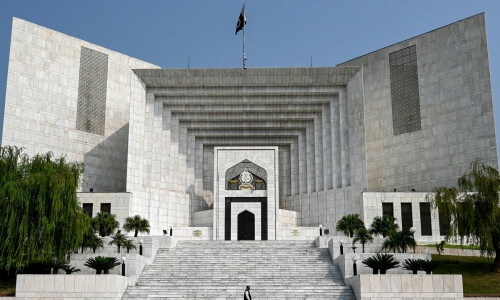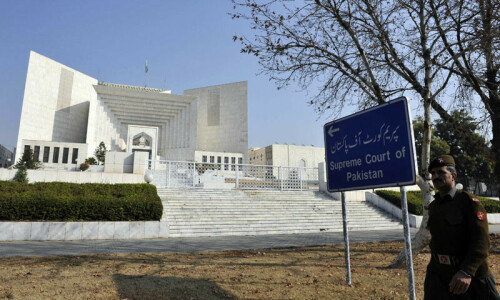KARACHI: The Sindh High Court on Thursday issued notices to the Cabinet Division, Ministry of Law & Justice and other respondents in two constitutional petitions impugning the 26th Constitutional Amendment.
Comprising Chief Justice Mohammad Shafi Siddiqui and Justice Jawad Akbar Sarwana, a two-judge bench, also put the attorney general and advocate general Sindh on notice for a date to be fixed in two weeks.
Citing the various federal and provincial authorities as respondents, three lawyers have filed two petitions against the constitutional amendment, asking the SHC for setting it aside and declaring ultra vires to the Constitution.
At the outset of the hearing, the bench noted that the petitions were brought before the bench to challenge the 26th Constitutional Amendment resurrecting some of the articles therein.
“We are cognisant of the fact that in terms of the amendment such questions are to be brought before the constitutional benches, however, the challenged amendments suggest that the application of Article 202A that enabled the formation of constitutional benches for the provinces could only be kicked in once the province /provinces have passed such resolution for onward carving out constitutional benches,” it noted.
In the absence of such resolution and constitutional benches, the bench said, the SHC was exercising its jurisdiction as per roster assigned to different benches.
The bench in its order also stated that the petitions while challenging 26th Amendment brought a question and in such an attempt, the counsels had argued that the amendment, in particular the articles therein related to the dispensation of justice, had shaken such structure.
Representing the petitioners, Ali Tahir and Ebrahim Saifuddin advocates also asserted that the amendment had been made in such a way that a litigant such as federation /province was seen to pick and choose benches for their own cause and for their own litigation, which had ignored a universal principle that justice should not only be done but seen to have been done.
They further contended that it had been shown to the public that the parliamentarians had conquered the judiciary by empowering their decisive strength in the judicial process and one of such processes was the formation of the Judicial Commission of Pakistan.
The lawyers claimed that the executive had stamped down the court by introducing such amendment and resurrecting such article to their desire and wisdom while a litigant could not be allowed to evaluate the judges’ performance so as to “bully” and “threaten” future benches and thus judiciary was rendered subservient.
The bench in its order said, “We are also cognisant of the fact that Article 239(5) & (6) limits the jurisdiction of this court, however, it has been explained that such limit could not overshadow or eclipse the fundamental rights guaranteed under the Constitution”.
The counsel for petitioners went on to argue that individuals might or might not matter, but the matter of concern was the executive’s invasion of the regime of the independent judiciary.
They contended that it was one such fundamental right that was the independence of the judiciary which was compromised and otherwise ensured later also in terms of the introduction of Article 10A of the Constitution, but certainly not limited to it alone.
The lawyers submitted that the preamble also guaranteed the safeguard of the fundamental rights and the judgement of the apex court handed down in the District Bar Association Rawalpindi’s case provided a mechanism as to how the fundamental rights could be secured while remaining within the frame of Article 239(5) & (6) of the Constitution.
The bench said: “Points raised require consideration. Since some of the articles through a recent amendment via 26th Amendment of the Constitution have been challenged, therefore, it requires a notice to the attorney general for Pakistan as well in terms of Order XXVII-A CPC. Order accordingly. Also issue notice to all the respondents as well and to the office of Advocate General Sindh for a date in about two weeks’ time”.
Mohammad Ashraf Samoon, a member of the Sindh Bar Council, and president of the Malir Bar Association, Nasir Raza, jointly petitioned the SHC while Illahi Bux advocate also filed an identical petition and besides the federal ministries concerned, the later also impleaded the chief secretary Sindh and the secretary of Sindh Assembly as respondents.
Published in Dawn, November 1st, 2024















































